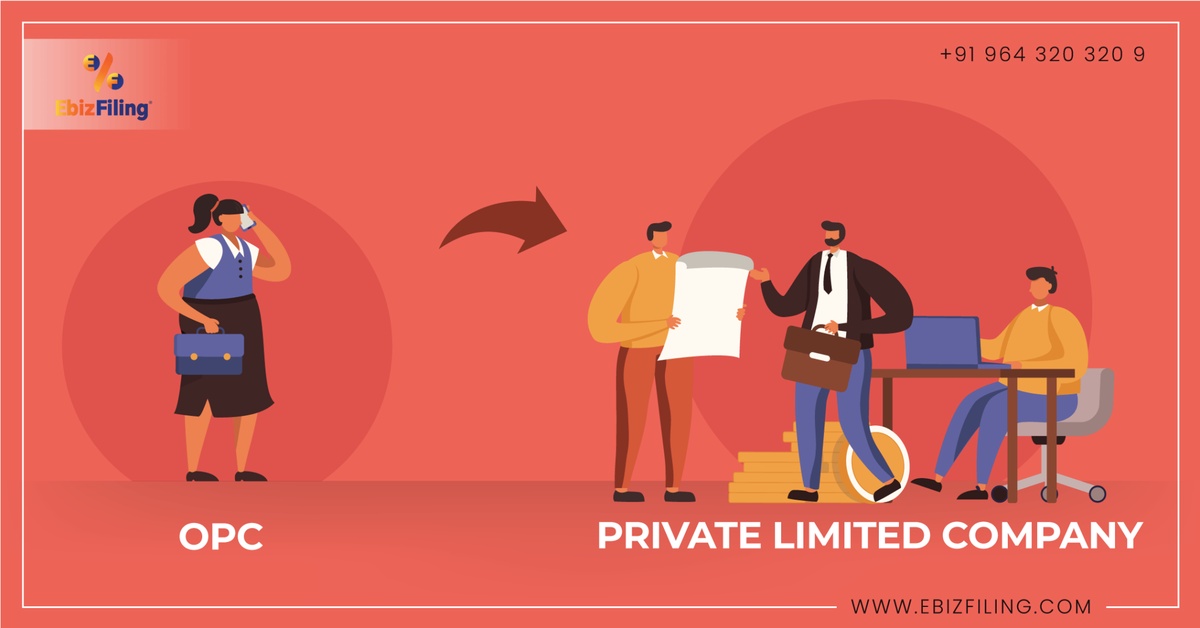Information on Conversion of OPC to Private Limited Company, and Process of Converting OPC to PVT LTD
Want to convert your One Person Company to a Private Limited Company? This article includes information such as the conversion of OPC to Private Limited company, advantages of conversion of OPC to PVT Ltd, and other relatable information on Conversion of OPC into Private Limited Company.
If you are seeking to register Pvt Ltd company, rest assured that the process of incorporation and registration can be carried out seamlessly, cost-effectively, and expeditiously with EbizFiling.
Introduction
Section 18 of the Companies Act, 2013, and the provisions of the Companies (Incorporation) Rules of 2014 enable the conversion of a One Person Company (OPC) into a Private Limited Company. During this conversion, the OPC’s existing debts, liabilities, commitments, and contracts remain unaffected.
Changes to the Memorandum of Association (MOA) and Articles of Association (AOA) of the OPC are necessary for the conversion, as per the provisions outlined in section 18 of the Companies Act, 2013, and section 122 of the Act.
Types of Conversion from OPC to Private Limited Company
1. Voluntary Conversion of OPC to Private Limited Company:
Section 18 of the Companies Act governs the process of voluntary conversion from an OPC to a Private Limited Company.
By amending the MOA and AOA in accordance with the provisions, the company can be converted into another company falling under the same legislation.
The company must submit an application for registration, along with the required documentation for the conversion. The registrar will issue a certificate of incorporation upon receiving all the necessary paperwork.
Any liabilities, debts, or obligations incurred before or after the conversion remain unaffected by the company’s registration under this act.
2. Compulsory Conversion of OPC to Private Limited Company:
The provision for compulsory conversion of OPCs based on minimum paid-up capital and average annual turnover was repealed in the Budget 2021–22.
Previously, if the paid-up capital of an OPC exceeded INR 50 lakhs and the average annual turnover of the previous three years exceeded INR 2 crores, the conversion was mandatory. However, it is no longer required for OPCs.
A special resolution needs to be passed in a general meeting to convert the company. Prior to approving the resolution, a No Objection Certificate signed by both creditors and other members must be obtained.
Advantages of Conversion from OPC to Private Limited Company
1. Limited Liability:
The company’s debts or obligations do not impose any charge on the owner’s personal assets. The liability is limited to the unpaid subscribed capital amount.
2. Easy Fundraising:
Raising funds as a Private Limited Company is relatively straightforward, as it allows for the sale of shares and provides various funding options such as ESOPs and private equity.
3. Separate Legal Entity:
When a Private Limited Company is formed, it becomes a distinct legal entity separate from its owners and managers in the eyes of the law. The company can conduct business in its own name, open bank accounts, own assets, and enter into contracts with third parties. Additionally, it has the ability to initiate legal actions.
4. Tax Benefits:
One Person Company is not considered a separate legal entity, resulting in taxation based on the individual tax slab. However, upon converting from OPC to Private Limited Company, the tax slab is fixed at 30%, enabling businesses to save on taxes.
Difference between OPC to Private Limited Company

Documents required for conversion of One Person Company (OPC) to PVT LTD
- The company’s directors would be given an affidavit confirming that all of the company’s members and creditors have given their consent for the conversion and that the company’s paid-up share capital is less than INR 50 lakhs rupees or its average annual turnover is less than INR 2 crores rupees, as the case may be;
- The list of creditors and members
- The most current audited balance sheet and profit and loss account
- A copy of the secured creditors’ No Objection Certificate.
Process of converting OPC to PVT LTD
- ROC needs to be notified about the conversion
It is mandatory for OPC to notify ROC (Registrar Of Companies) for converting itself into a Private Limited Company. For converting it is necessary to discuss it with ROC first and after that, a process needs to proceed.
- Board resolution needs to be passed
The OPC should organize a general meeting to pass a resolution appointing directors and members to meet the Private Limited Company’s standards. At least two members and two directors are required to convert an OPC into a Private Limited Company.
A board resolution should also be passed to approve changes to the OPC’s Articles of Association (AOA) and Memorandum of Association (MOA).
- File an application (e-Form INC-6)
After completing the preceding stages, the corporation must submit an application (e-Form INC-6) to the relevant ROC, together with the required documents
- Altered AOA and MOA
- Copy of high-resolution image
- The proposed members’ and directors’ list, as well as their permission
- Creditors’ list
- The most recent profit and loss account and balance sheet have been audited.
- With the application for conversion, include a copy of each creditor’s NOC.
- The nominee’s consent
- Proof of the nominee’s and member’s residence
- A copy of the member’s and nominee’s PAN cards
- Proof of the nominee’s and member’s identities
The ROC verifies that the application information is correct and that the registration fees have been paid. The Registrar Of Companies (ROC) then takes a decision after extensively reviewing the application and documents, if there is no error or issues with the conversion then ROC issues the certificate of conversion.
Conclusion:
The One Person Company was created in the legal system to encourage entrepreneurs to enter the corporate sector. It will not only allow individuals to contribute to economic growth, but it will also create job prospects.
The abolition of the minimum capital and turnover thresholds allows the OPC to obtain international investments without conversion restrictions. It allows OPC to convert voluntarily rather than mandatory after capital requirements are met.


No comments yet